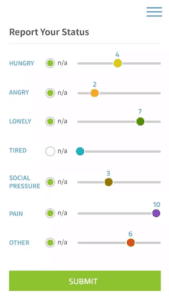The U.S. Food and Drug Administration (FDA) last week approved the marketing of a mobile medical app to help treat substance abuse disorders (SUDs)—the first software of its kind permitted to claim it improves patient outcomes in the treatment of a disease.
The reSET system, developed by Pear Therapeutics, is a prescription digital therapeutic—a term used for FDA-cleared software that has demonstrated safety and efficacy in randomized clinical trials. Prescription digital therapeutics usually include patient-facing applications, clinical assessment and outcomes tracking, clinician monitoring dashboards and HIPAA-compliant data storage.
A Pear Therapeutics spokeswoman says that, while prescription digital therapeutics exist, the FDA has never before granted permission to market one with claims of improving clinical outcomes in the treatment of a disease. In this case, the approved use is the treatment of SUDs related to stimulants, cannabis, cocaine and alcohol.
While it is software, reSET is classified as a Class 2 medical device, the Pear Therapeutics spokeswoman says. The prescription-only app is distributed via Google Play and Apple’s App Store, but a c

A screenshot from the reSet app, approved for the treatment of substance abuse disorders.
ode provided by a physician will be required to use the app.
The reSET product consists of a patient app designed to teach skills that aid in the treatment of SUDs, along with an online dashboard accessed by clinicians. The ultimate goals are to increase abstinence from abused substances and increase retention in outpatient therapy programs.
The 12-week reSET treatment is intended for patients 18 years of age and older who are currently enrolled in outpatient treatment under the supervision of a clinician. It is designed to be an adjunct to a contingency management system—a widely used type of behavioral therapy in which patients are rewarded for positive behavioral changes.
The treatment is not approved for use in the treatment of opioid abuse, but is aimed at patients who are not currently on opioid replacement therapy, who do not abuse alcohol solely, or who do not abuse opioids as their primary substances of abuse.
The reSET device was reviewed through the FDA’s de novo premarket review pathway, a regulatory pathway for some low- to moderate-risk devices that are novel and for which there is no legally marketed predicate device to which the device can claim substantial equivalence.
The FDA says reSET was approved after the agency reviewed data from a multi-site, 12-week clinical trial of 399 patients who received either standard treatment or standard treatment with the addition of a desktop-based version of Reset which could be accessed at the clinic or at home.
According to the FDA, data from the clinical trial showed a statistically significant increase in adherence to abstinence for the patients with alcohol, cocaine, marijuana and stimulant SUD in those who used Reset, 40.3%, compared to the patients who did not, 17.6%. The clinical trial did not demonstrate the effectiveness of using reSET in patients reporting opioids as their substance of abuse. Data did not indicate any side effects associated with the use of reSET.
“This is an example of how innovative digital technologies can help provide patients access to additional tools during their treatment,” said Carlos Peña, director of the Division of Neurological and Physical Medicine Devices in FDA’s Center for Devices and Radiological Health. “More therapy tools means a greater potential to help improve outcomes, including abstinence, for patients with substance use disorder.”
Full prescribing information can be found at www.peartherapeutics.com.
Favorite